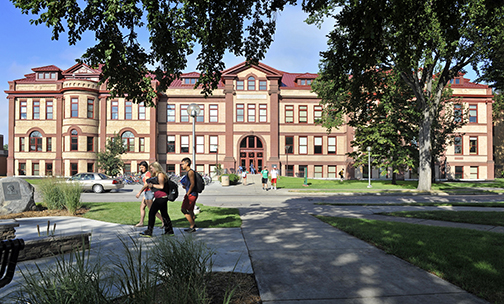Sociology is the study of human social interaction and social organizations. Sociologists study social change, diverse communities and their interactions, and use scientific methods to find empirical answers to complex social questions. Studying sociology fosters creativity, innovation, critical thinking, analytic problem solving, and communication skills. Sociology majors are employed in a variety of business, nonprofit, and government jobs.
The Program
Sociologists attempt to develop a better understanding of the way society works. They examine social relationships in institutions like the family, religion, the economy, health care, media, education and government. Sociology majors develop applied research and analytical skills and a perspective that prepares them to address social concerns. Courses are offered on campus and online. North Dakota State University offers graduate work leading to a master’s degree and frequently has students who pursue doctorates at other universities.
Faculty and Facilities
The faculty in sociology have varying research interests and areas of specialization. The sociology faculty provide expertise in areas such as gender, research methods, social psychology, education, social inequality, religion, and community development. They employ survey, ethnographic, and experimental design methods. The department contains two social research laboratories.
Career Opportunities
Sociological expertise can be useful in careers that involve community service, research analysis, non-profit organizations, human and social services, urban and regional planning, population analysis, economic or marketing studies, health-related industries, agricultural and rural life advocacy, government administration, and policy research. For more information on sociology employment, refer to the North Dakota State University Sociology website or visit the American Sociological Association website at https://www.asanet.org.
Internship Program
Students in sociology may apply for the internship program. Students typically complete internships during their junior or senior year. Internship opportunities exist in many agencies in North Dakota and Minnesota and can be done any time during the calendar year. Students who complete internships are able to combine the theoretical and applied aspects of professional preparation. Our students have worked in a variety of settings including human and social services, volunteer agencies, community development, business and industry.
The Curriculum
Sociology students explore their interests within the program, including social psychology, social inequality, community development, applied sociology, environmental sociology, gerontology, and gender issues, by taking classes in the areas of their choice.
Sample Program Guide
IMPORTANT DISCLAIMER: A Sample Program Guide provides an unofficial guide of program requirements and should be used by prospective students who are considering attending NDSU in the future. It is NOT an official curriculum and should NOT be used by current NDSU students for official degree planning purposes. Note that the official curriculum used by current NDSU students can vary from the Sample Program Guide due to a variety of factors such as, but not limited to, start year, education goals, transfer credit, and course availability.
To ensure proper program completion, enrolled students should utilize Degree Map and Schedule Planner in Campus Connection and consult regularly with their academic advisor to ensure requirements are being met.
| First Year |
|---|
| Fall | Credits | Spring | Credits |
|---|
| ANTH 111 or 2061 | 3 | COMM 110 | 3 |
| SOC 110, 115, or 1161 | 3 | ENGL 120 | 3 |
| ENGL 110 | 3 | Gen Ed Humanities/Fine Arts & Global Perspectives | 3 |
| Gen Ed Science/Technology w/ Lab | 4 | Gen Ed Quantitative Reasoning | 3 |
| Gen Ed Wellness | 2 | Free Elective | 3 |
| | 15 | | 15 |
| Second Year |
|---|
| Fall | Credits | Spring | Credits |
|---|
| SOC 2141 | 3 | SOC 4101 | 3 |
| AHSS Area One College Requirement | 3 | SOC 298 | 1 |
| Gen Ed Science/Technology | 3 | AHSS Area Two College Requirement | 3 |
| Minor or Language | 3 | Gen Ed Science/Technology | 3 |
| Free Elective | 3 | Minor or Language | 3 |
| | Gen Ed Humanities/Fine Arts & Cultural Diversity | 3 |
| | 15 | | 16 |
| Third Year |
|---|
| Fall | Credits | Spring | Credits |
|---|
| SOC 3401 | 3 | SOC 4221 | 3 |
| SOC 4701 | 3 | Sociology Major Electives (See curriculum) | 3 |
| Sociology Major Elective (see curriculum) | 3 | Minor or Language | 3 |
| Gen Ed Upper Level Writing | 3 | Free Elective | 6 |
| Minor or Language | 3 | |
| | 15 | | 15 |
| Fourth Year |
|---|
| Fall | Credits | Spring | Credits |
|---|
| SOC 494 or 496 | 1 | Sociology Major Elective (see curriculum) | 3 |
| Sociology Major Elective (see curriculum) | 3 | AHSS Area Three College Requirement | 3 |
| Minor or Language | 3 | Elective or minor | 6 |
| Free Electives | 7 | Free Elective | 3 |
| | 14 | | 15 |
| Total Credits: 120 |

